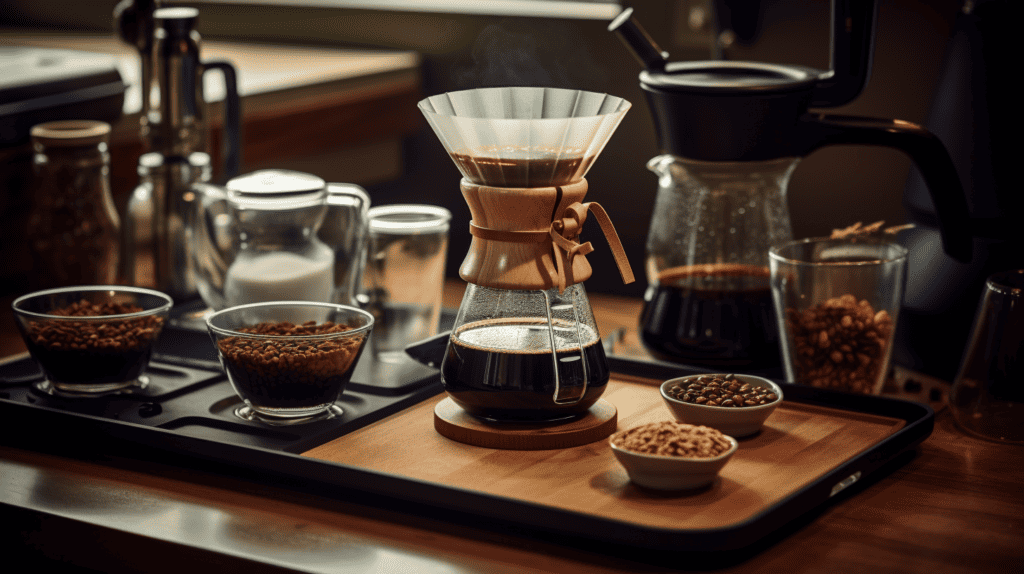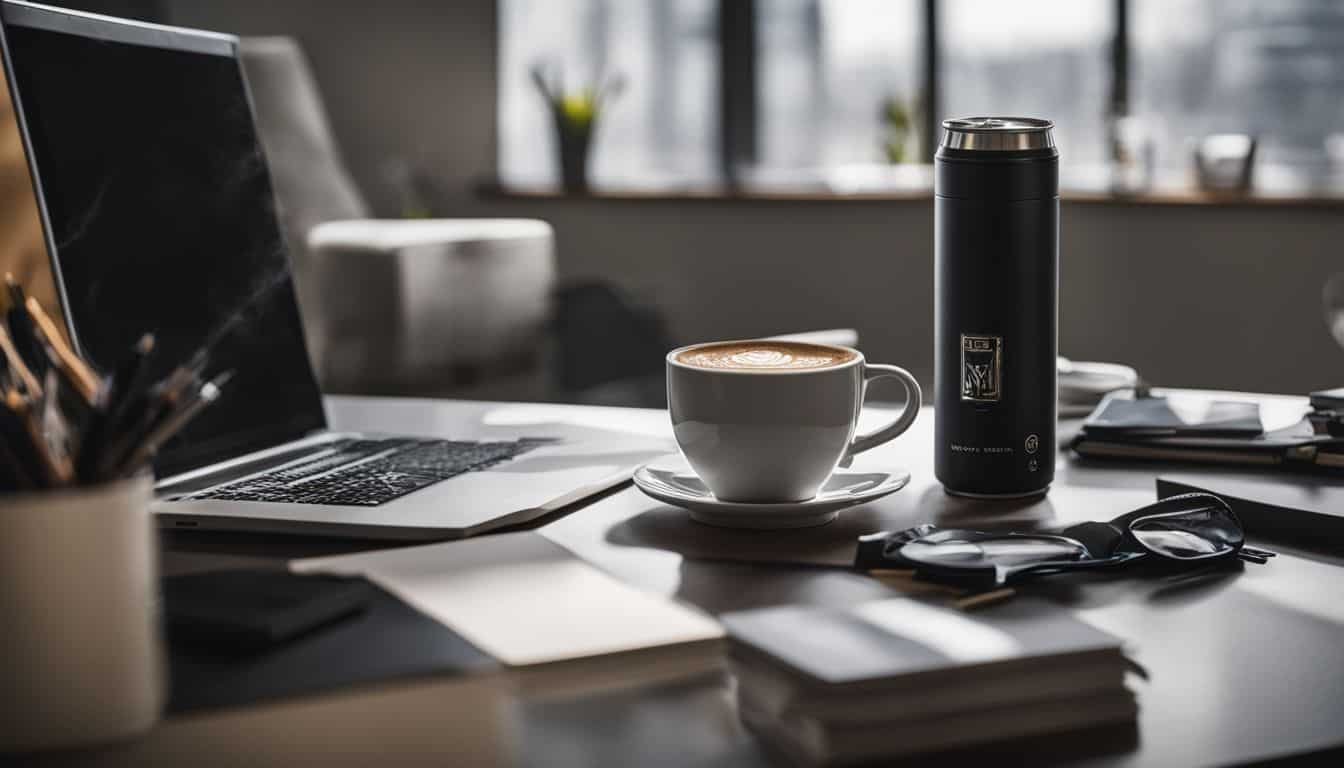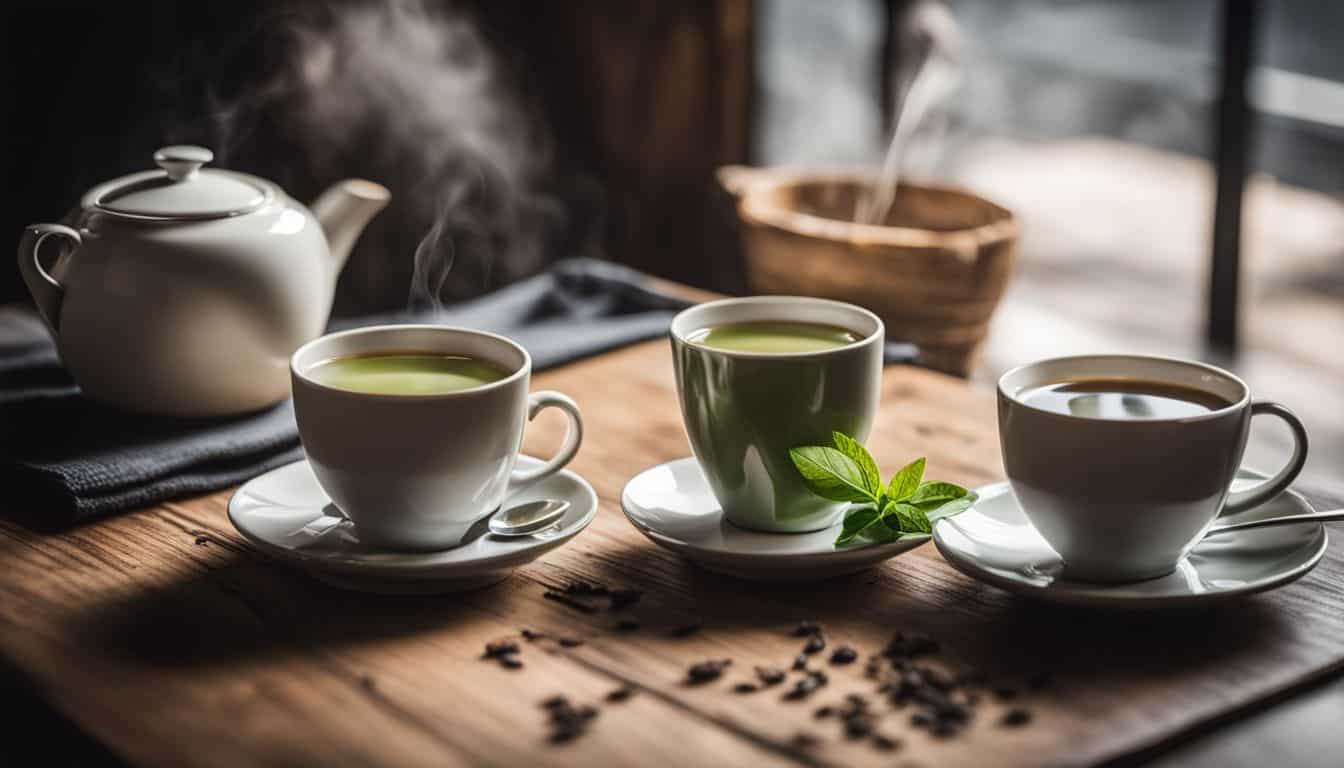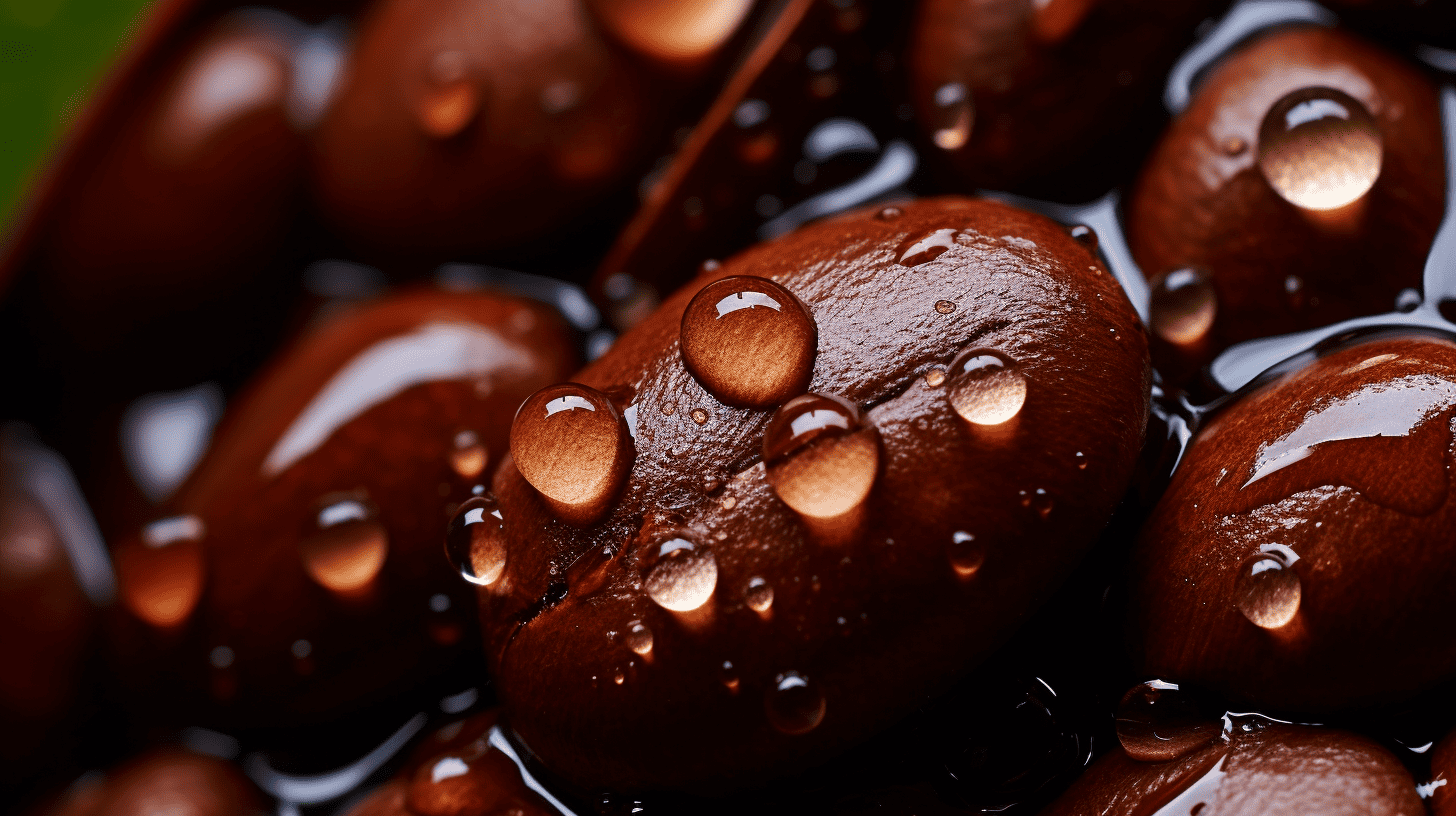Have you ever found yourself struggling to stay awake, torn between coffee or energy drink to stay awake? Me too. After doing some in-depth research and comparing their caffeine levels, I’ve discovered that coffee typically contains 18mg of caffeine per ounce while energy drinks just 10mg.
In this blog post, we’ll dive deeper into the pros and cons of both these beverages to help you make the best choice for your wakefulness needs. Stick around and let’s get buzzy!
Key Takeaways
- Coffee typically contains more caffeine than energy drinks, with 18mg per ounce compared to 10mg per ounce.
- Both coffee and energy drinks can help keep you awake due to their caffeine content, but coffee provides a better-sustained energy boost.
- Energy drinks often have high sugar content, while coffee is usually free of added sugars, making it a healthier option for staying awake.
- Consider personal preferences and factors like caffeine tolerance, taste preference, and convenience when choosing between coffee and energy drinks.
Caffeine Content and Effects
When comparing coffee and energy drinks, it is important to consider the amount of caffeine in each beverage and its impact on wakefulness and alertness.
Coffee vs Energy Drinks
Both coffee and energy drinks pack a punch of caffeine. Coffee wins in the caffeine game with about 18mg per ounce, while energy drinks have 10mg. This means you’ll feel less tired after drinking both.
However, you should be careful as these effects can linger for up to six hours! Energy drinks often carry a lot of sugar too. Yes, it gives an extra kick but doesn’t do our health any good in the long run.
On the other hand, black coffee is full of great stuff like antioxidants and lacks nasty fake bits found in some energy drink brands.
Amount of caffeine in each beverage
As a coffee enthusiast, I’m sure you’re interested in the caffeine content of your favorite drink compared to that of energy drinks. Let’s take a look at the figures.
| Beverage | Caffeine Content per Ounce |
|---|---|
| Coffee | 18mg |
| Energy Drink | 10mg |
This table clearly shows that coffee has a higher caffeine content compared to energy drinks. This amount of caffeine in coffee makes it a potent energy booster, helping to fight off sleepiness and keep you alert for up to six hours. The caffeine in energy drinks, although less in quantity, provides a similar effect, offering a quick energy jolt.
Now, it’s essential to remember that both of these beverages can provide a sustained energy boost but coffee, being higher in caffeine, offers a better-sustained energy boost than energy drinks. Plus, coffee is typically free of artificial ingredients found in energy drinks, making it a healthier choice overall.
So, the next time you reach for an energy drink, you might want to consider having a cup of coffee instead. Not only will it give you a stronger caffeine kick, but it also comes packed with antioxidants and without the artificial ingredients.
Impact of caffeine on wakefulness and alertness
Caffeine has a significant impact on wakefulness and alertness. When we consume caffeine from coffee or energy drinks, it stimulates our brain and helps us feel more awake and focused.
Caffeine blocks adenosine, a chemical that makes us sleepy, which allows us to stay awake for longer periods of time. It also increases the production of dopamine in the brain, which improves our mood and concentration.
Caffeine’s effects can last for several hours after consumption. This means that if you’re feeling tired or need an energy boost, a cup of coffee or an energy drink can help keep you alert and focused throughout the day.
Sugar Content and Health Effects
Comparing the sugar content in coffee and energy drinks reveals potential health risks associated with excessive intake.
Comparison of sugar content in coffee and energy drinks
Coffee and energy drinks differ in terms of their sugar content. Energy drinks often contain high amounts of sugar, which contribute to the jolt of energy they provide. On the other hand, coffee is typically free of added sugars, especially if you drink it black. This makes coffee a healthier option compared to energy drinks when considering sugar intake. By choosing coffee over energy drinks, you can avoid excessive sugar consumption and still enjoy the benefits of caffeine for boosting your alertness and staying awake.
Health risks associated with excessive sugar intake
Excessive sugar intake can lead to various health risks. Consuming too much sugar on a regular basis can cause weight gain and increase the risk of developing obesity, type 2 diabetes, and heart disease.
It can also negatively impact dental health, leading to cavities and tooth decay. Consuming high amounts of sugary drinks like energy drinks can contribute to these risks, as they often contain high levels of added sugars.
By choosing coffee instead, which is generally free from added sugars, you can reduce your risk of these health issues while still enjoying a boost in alertness and wakefulness from the caffeine content.
Other Ingredients and Potential Side Effects
In this section, we will explore the additional ingredients found in coffee and energy drinks, as well as the potential side effects associated with their consumption.
Overview of additional ingredients in coffee and energy drinks
Coffee and energy drinks contain additional ingredients that can affect your body in different ways. Here are some of them:
- Artificial sweeteners: Some energy drinks use artificial sweeteners to reduce sugar content and calories, but these may have potential health risks.
- Taurine: Energy drinks often include taurine, an amino acid that can improve exercise performance and increase alertness.
- B vitamins: Both coffee and energy drinks can contain B vitamins such as niacin, thiamine, and riboflavin, which help convert food into energy.
- Herbal extracts: Energy drinks sometimes contain herbal extracts like guarana or ginseng, believed to provide an additional energy boost.
- Carbonation: Many energy drinks are carbonated, which can cause bloating or discomfort for some people.
- Creamers and flavorings: Coffee allows for customization with creamers and flavorings, allowing you to personalize your drink according to your taste preferences.
Potential side effects and risks
It’s important to be aware of the potential side effects and risks associated with consuming coffee or energy drinks. While caffeine can provide a temporary boost in wakefulness and alertness, it can also have some negative effects.
Too much caffeine can lead to increased heart rate, high blood pressure, jitters, and difficulty sleeping. Energy drinks that contain high amounts of sugar can contribute to weight gain, tooth decay, and an increased risk of developing conditions like diabetes.
It’s crucial to consume these beverages in moderation and be mindful of your personal tolerance for caffeine. Additionally, some energy drinks may contain additional ingredients like taurine or guarana extract that could have more pronounced effects on the body.

Personal Preferences and Considerations
Consider factors such as taste preferences, caffeine tolerance, and desired energy levels when making a choice between coffee and energy drinks.
Factors to consider when choosing between coffee and energy drinks
- Caffeine content: Consider how much caffeine you need to stay awake and alert. Coffee typically has more caffeine than energy drinks.
- Personal tolerance: Think about how your body reacts to caffeine. Some people are more sensitive to its effects than others.
- Sugar intake: Take into account the amount of sugar in each beverage. Energy drinks often have high sugar content, which may not be ideal for your health.
- Health benefits: Consider the additional benefits of coffee, such as antioxidants, which can improve overall health.
- Artificial ingredients: Keep in mind that some energy drinks may contain artificial ingredients that you may want to avoid.
- Duration of energy boost: Determine whether you need a quick burst of energy or a longer-lasting effect. Coffee provides a sustained boost, while energy drinks can offer an immediate jolt but may lead to a crash later on.
- Taste and preference: Consider your personal taste preferences when deciding between coffee and energy drinks.
- Convenience and availability: Think about where and when you can access coffee or energy drinks easily, especially during times of fatigue or when studying.
Remember, it’s important to make an informed choice based on these factors that best suits your needs and preferences without overdoing it with the caffeine or sugar intake.
Individual tolerance and preferences
Everyone is different when it comes to caffeine tolerance and personal preferences. Some people may find that coffee gives them the perfect energy boost they need, while others might prefer the quick jolt from an energy drink.
It’s important to consider how much caffeine you can handle without feeling jittery or experiencing side effects. Additionally, think about whether you enjoy the taste of coffee or if you prefer the flavors offered by energy drinks.
Finding what works best for you will ensure that you stay awake and alert when you need it most.
Conclusion: Making an Informed Choice
After considering the caffeine and sugar content, personal preferences, and potential health effects, it becomes clear that making an informed choice between coffee or energy drinks to stay awake is crucial for maintaining wakefulness and alertness while minimizing potential risks.
Considering caffeine and sugar content, personal preferences, and health effects
When choosing between coffee and energy drinks, it is important to consider factors such as caffeine and sugar content, personal preferences, and health effects. Coffee generally contains more caffeine than energy drinks, with 18mg per ounce compared to 10mg per ounce.
Both beverages can help keep you awake due to their caffeine content, providing a jolt of energy and minimizing weariness. However, energy drinks often have high amounts of sugar which contribute to the energy boost.
On the other hand, coffee is packed with antioxidants that offer additional health benefits. It is also typically free of artificial ingredients found in some energy drinks. Ultimately, the choice between coffee and energy drinks depends on individual tolerance and preferences for caffeine consumption as well as desired health effects.
Which is More Effective for Increasing Energy Levels: Coffee or Energy Drinks?
When it comes to energy-boosting options compared, the debate intensifies between coffee and energy drinks. While both caffeinated beverages provide a temporary boost, coffee harnesses its energizing effects from natural sources. Energy drinks, on the other hand, pack a punch with added ingredients like taurine and B-vitamins. Ultimately, the effectiveness depends on personal preferences and tolerance levels.
FAQs on Coffee Or Energy Drink To Stay Awake
1. Which is better for staying awake, coffee or energy drinks?
Coffee and energy drinks can both help you stay awake, but it’s a matter of personal preference. Some people find that the caffeine in coffee gives them a more gradual and sustained boost of energy, while others prefer the quick burst of energy from energy drinks.
2. How much coffee or energy drink should I consume to stay awake?
The amount of coffee or energy drink you need to stay awake varies depending on your tolerance to caffeine and individual factors. It’s best to start with a small amount and see how it affects you before consuming more.
3. Are there any side effects of drinking too much coffee or energy drinks?
Drinking too much coffee or energy drinks can lead to side effects such as increased heart rate, jitteriness, anxiety, insomnia, and dehydration. It is important to consume these beverages in moderation and be mindful of your overall caffeine intake.
4. How long does the effect of coffee or an energy drink last?
The effects of coffee or an energy drink typically last for several hours, but this can vary depending on factors such as your metabolism and sensitivity to caffeine. It’s important not to consume these beverages too close to bedtime if you want a good night’s sleep.





Leave a Reply